 MyDogBreeds
MyDogBreeds Redbone Coonhound is originated from United States but Basque Shepherd is originated from Spain. Redbone Coonhound may grow 9 cm / 4 inches higher than Basque Shepherd. Both Redbone Coonhound and Basque Shepherd are having almost same weight. Both Redbone Coonhound and Basque Shepherd has almost same life span. Both Redbone Coonhound and Basque Shepherd has almost same litter size. Redbone Coonhound requires Low maintenance. But Basque Shepherd requires Moderate maintenance
Redbone Coonhound is originated from United States but Basque Shepherd is originated from Spain. Redbone Coonhound may grow 9 cm / 4 inches higher than Basque Shepherd. Both Redbone Coonhound and Basque Shepherd are having almost same weight. Both Redbone Coonhound and Basque Shepherd has almost same life span. Both Redbone Coonhound and Basque Shepherd has almost same litter size. Redbone Coonhound requires Low maintenance. But Basque Shepherd requires Moderate maintenance
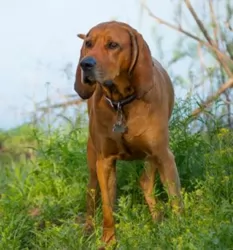 The Redbone Coonhound has always had a busy life hunting bear, deer and cougar. It is thought that this dog descends from from Bloodhounds, Foxhounds and Irish Hounds.
The Redbone Coonhound has always had a busy life hunting bear, deer and cougar. It is thought that this dog descends from from Bloodhounds, Foxhounds and Irish Hounds.
Hailing from America, this dog has been registered with the American Kennel Club since 2009.
It was during the 18th century that many European-type hunting dogs were imported to America. Over time, Southern hunters bred with stamina and this ultimately lead to the emergence of coonhounds.
 The Basque Shepherd is one of the oldest dog breeds. With this Spanish dog, you’ll find paintings dating back 12,000 years ago. The Basque Shepherd is known as a landrace breed, which means the dog hasn’t gone through the same selective breeding programs as what other breeds have. Landrace breeds have more variations in appearance and temperament than regular breeds.
The Basque Shepherd is one of the oldest dog breeds. With this Spanish dog, you’ll find paintings dating back 12,000 years ago. The Basque Shepherd is known as a landrace breed, which means the dog hasn’t gone through the same selective breeding programs as what other breeds have. Landrace breeds have more variations in appearance and temperament than regular breeds.
The Basque Shepherd has 2 distinct varieties, the Gorbeiakoa and the Iletsua. The smooth-haired Gorbeiakoa has a softer coat that is fairly short while the rougher-haired Iletsua has a lighter coloured coat, and unlike the Gorbeiakoa, the ears are not typically erect.
Even though this is an ancient breed of dog, only the Royal Canine Society of Spain recognizes the breed with the two varieties, and in January 1996, the two breeds - Iletsua and Gorbeikoa – were recognized.
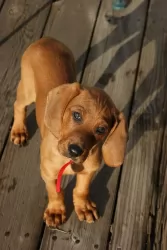 This beautiful, shiny red dog is medium-sized and stands at between 53 and 70cm at the shoulders and weighs between 20 and 32kg.
This beautiful, shiny red dog is medium-sized and stands at between 53 and 70cm at the shoulders and weighs between 20 and 32kg.
The dog’s coat is short and smooth with maybe just a tiny bit of white found around the feet and chest area. He is lean and muscular with strong, straight legs and a deep chest. The ears are floppy and the tail, traditionally docked, is often left long these days.
The paws are large and webbed and when the dog is excited, the tail is held high
The Redbone Coonhound is an affectionate dog who wants to please his owners. He just loves his human family and would be beside himself if he were locked outside day after day.
He is a social dog who should be allowed time indoors and out. They make splendid playmates for children too, and get along well with other animals in the house.
Because they’re independent and strong willed, he will need to be trained and socialized to ensure he is well mannered and obedient.
He is an active dog and will require a good bout of exercise. He is vocal, known for his baying type of bark, and training will keep this kind of baying under control. Training is also necessary as this dog is stubborn. He is intelligent enough to learn, and once trained, is gentle and calm.
 The Basque Shepherd is a strong, well proportioned dog with brown eyes and medium sized ears, which sometimes have folds. This medium-to-large dog has a beautiful fawn coat of medium-length hair that can be straight or slightly wavy. He has a long feathery tail that will wag readily when he sees his owner. You’ll find other colors for the Basque Shepherd shared between the two varieties - a yellow orange or copper coat with other shades being red, blue and black. His hair is shorter on the head and he doesn’t battle with hair over the eyes.
The Basque Shepherd is a strong, well proportioned dog with brown eyes and medium sized ears, which sometimes have folds. This medium-to-large dog has a beautiful fawn coat of medium-length hair that can be straight or slightly wavy. He has a long feathery tail that will wag readily when he sees his owner. You’ll find other colors for the Basque Shepherd shared between the two varieties - a yellow orange or copper coat with other shades being red, blue and black. His hair is shorter on the head and he doesn’t battle with hair over the eyes.
The Basque Shepherd is a highly intelligent dog and also very energetic. Of the two different kinds of Basque Shepherd, it is the Gorbeiakoa which is the more outgoing. The dogs will require a firm owner and they thrive on the discipline when it is combined with lots of with lots of exercise and activities.
The Basque Shepherd is generally friendly with people, if not a little reserved with strangers. He gets on well with children and other pets in the home, although socialization and training will be necessary to bring out their best.
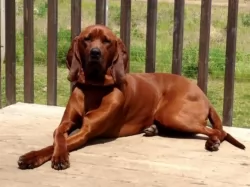 The Redbone loves the company of his human family. He is such a friendly dog,getting on well with everyone in the family, including the children and other pets.
The Redbone loves the company of his human family. He is such a friendly dog,getting on well with everyone in the family, including the children and other pets.
He is a hunting dog and always ready to be part of any activities his human family is involved in. He is gentle and easy going, and and having him in your life is guaranteed to bring in a lot of joy and sunshine.
 The dog is well suited to being a family pet, loving to spend time with family, being a people-oriented breed. He gets on well with children as well as other pets in the home, but can be reserved with strangers.
The dog is well suited to being a family pet, loving to spend time with family, being a people-oriented breed. He gets on well with children as well as other pets in the home, but can be reserved with strangers.
He doesn’t have an aggressive nature, and yet he does what it takes to protect his beloved human family.
He is full of energy, hardy and tough. He loves his human family and wants to be included in all their activities. He is energetic though and as a responsible dog owner, you want to make sure that your Basque Shepherd has enough space to run.
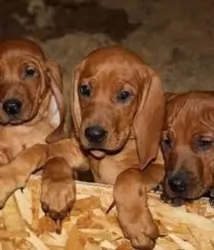 The Redbone Coonhound is generally a healthy breed that can reach 12, 13, 14 years of age if well cared for.
The Redbone Coonhound is generally a healthy breed that can reach 12, 13, 14 years of age if well cared for.
There are some common dog illnesses that this do can succumb to and which are worth knowing about as they affect so many dogs. These are cancer, bloat, skin allergies, ear infections and hip dysplasia.
If you notice that your active dog is subdued and lethargic, it is your responsibility to get your 4-legged child to the vet to be looked over.
 Because this is an ancient breed, the Basque Shepherd doesn’t have to contend with genetic health problems such as more modern breeds. Just like other dogs though, he could be prone to certain conditions such as hip dysplasia, eye problems, ear infections and cancer. As a larger breed, he may also be prone to bloat.
Because this is an ancient breed, the Basque Shepherd doesn’t have to contend with genetic health problems such as more modern breeds. Just like other dogs though, he could be prone to certain conditions such as hip dysplasia, eye problems, ear infections and cancer. As a larger breed, he may also be prone to bloat.
Breeds with floppy ears, such as the Basque Shepherd will be more prone to developing ear infections. To prevent infection, keep his ears clean and dry. If you’re unsure, the vet can guide you how- and what to do.
This is a disease which is common to other dog breeds too and not just the Basque Shepherd. This condition affects the hip joints and can result in chronic pain for the dog and also lameness. Checking your dog’s weight is important and the pain can be managed with medication.
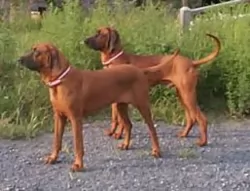 Hunting dogs such as the Redbone Coonhound will need a good deal of exercise to stay happy and healthy. The breed is best suited to the countryside or suburbs as opposed to city dwelling.
Hunting dogs such as the Redbone Coonhound will need a good deal of exercise to stay happy and healthy. The breed is best suited to the countryside or suburbs as opposed to city dwelling.
He won’t be content with just a walk every day but is the kind of dog that will want to be free from a leash and be running far and wide. When at home, involve him in some rope- and ball games.
The Redbone Coonhound isn’t going to be a dog that you have to fuss over. His short coat can be brushed twice a week to keep him looking beautifully shiny. When you brush him, make sure you check for any unusual lumps.
He has floppy ears, so look inside his ears for signs of redness and discharge. This could be an indication of an ear infection. Also check inside his mouth as he could have a rotting tooth which could be causing him a lot of pain and also be poisoning his body.
You want to ensure your beautiful Redbone Coonhound stands every chance to enjoy good health. Every dog owner should try to feed their dog the best food there is.
There are some good commercially manufactured foods on the market and these are wonderfully convenient to use for your dog. However, you want to provide him with some good homemade food too.
Dogs thrive on simplicity and consistency with their diets because then it prevents upset stomachs. Some home-cooked food such as boiled chicken, sweet potatoes, brown rice or pasta, carrots and spinach will be perfect for him.
Chop the food up finely and add it into the dry kibble once or twice a week. Raw meat can also be added in occasionally to promote good skin health. Make sure your pet is never without a constant supply of fresh, cool water.
 This is a medium to large breed dog and he should therefore be fed a high quality food which has been formulated for medium to large breeds. Because he is a herding dog, you might want to also look at an active-dog or working-breed formula to supply him with that much needed energy.
This is a medium to large breed dog and he should therefore be fed a high quality food which has been formulated for medium to large breeds. Because he is a herding dog, you might want to also look at an active-dog or working-breed formula to supply him with that much needed energy.
The Basque Shepherd’s coat is lush and long with either straight or wavy hair. Regular brush at least twice a week will maintain the coat, get rid of loose hair and prevent fleas.
The Basque Shepherd is an intelligent breed that will respond well to socialization and training. He is a breed that loves sports too because of this very high energy levels. You need to be careful with the Basquae Shepherd around small children, not because he is aggressive in any way, but because he is highly active, and his exuberance and boisterous antics could see him unintentionally knocking over small children.